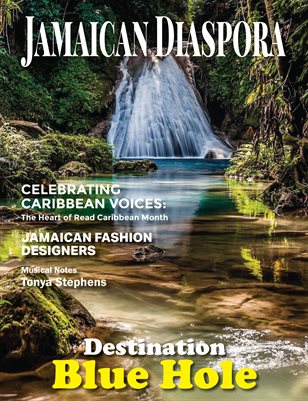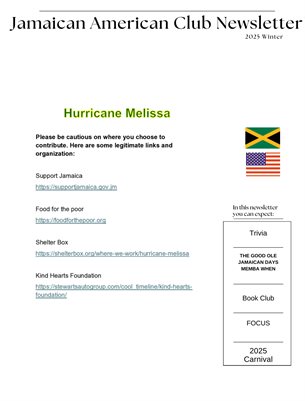By Donald J. Harris
Reflections of a Jamaican Father By Donald J. Harris As a
child growing up in Jamaica, I often heard it said, by my parents and family
friends: “memba whe yu cum fram”. To this day, I continue to retain the deep
social awareness and strong sense of identity which that grassroots Jamaican
philosophy fed in me. As a father, I naturally sought to develop the same
sensibility in my two daughters. Born and bred in America, Kamala was the first
in line to have it planted.
Maya came two years later and had the advantage of an older
sibling as mentor. It is for them to say truthfully now, not me, what if
anything of value they carried from that early experience into adulthood. My
one big regret is that they did not come to know very well the two most
influential women in my life: “Miss Chrishy” and “Miss Iris” (as everybody
called them). This is, in many ways, a story about these women and the heritage
they gave us.
My roots go back, within my lifetime, to my paternal
grandmother Miss Chrishy (née Christiana Brown, descendant of Hamilton Brown
who is on record as plantation and slave owner and founder of Brown’s Town) and
to my maternal grandmother Miss Iris (née Iris Finegan, farmer and educator,
from Aenon Town and Inverness, ancestry unknown to me). The Harris name comes
from my paternal grandfather Joseph Alexander Harris, land-owner and
agricultural ‘produce’ exporter (mostly pimento or all-spice), who died in 1939
one year after I was born and is buried in the church yard of the magnificent
Anglican Church which Hamilton Brown built in Brown’s Town (and where, as a
child, I learned the catechism, was baptized and confirmed, and served as an
acolyte). Both of my grandmothers had the strongest influence on my early
upbringing (“not to exclude, of course, the influence of my dear mother” Miss
Beryl” and loving father “Maas Oscar”).
It was here that she was in her groove, while engaged in
lively and sometimes intense conversation with all who came into the shop about
issues of the day. Business was front and centre for her, a profession and a
family tradition that she embodied and carried with purpose, commitment, pride,
and dignity (next to her devotion to the church that, as she often said, her
ancestor built). She never paid much attention to the business of the farm at
Orange Hill. Her sons took care of that side of the family business.
Her constant focus was on issues that affected her business
of buying and selling imported ‘dry goods’ as well as the cost of living,
issues that required understanding and keeping up with the news – a task which
she pursued with gusto. She was also fully in charge of ‘domestic affairs’ in
our home and, of course, had raised eight children of her own at an earlier
age. There was a daily diet of politics as well. She was a great admirer of
‘Busta’ (Sir William Alexander Bustamante, then Chief Minister in the colonial
government and leader of the Jamaica Labour Party (JLP).
She claimed, with conviction and pride, to be a “Labourite”
(as members of the JLP were called) and for the interesting reason that, as she
argued, “labour is at the heart of everything in life”. Little did I know then,
what I learned later in studying economics, that my grandmother was espousing
her independently discovered version of a Labour Theory of Value! Her
philanthropic side shone through every Easter and Christmas when she had my
sister Enid and me package bun and cheese (a favourite Jamaican Easter fare)
and other goodies in little boxes that we carried and delivered to families
living in the area around our home. She died in 1951 at the age of 70.
Her departure left me, then only fourteen, with a deep sense
of sadness and loss. Miss Iris, mother of eight children too, was the sweetest
and gentlest person one could meet, but underneath it was a tough farming woman
who ran the cane farm at Thatch Walk (near Aenon Town) jointly owned with her
husband “Mr Christie”. She was always ready to go to church on Sunday to preach
and teach about the “Revelations” she saw approaching the world at that time
(during and after World War II) in accord with the Bible. I spent summers with
her, roaming around the cane field, fascinated by the mechanical operation of
cane ‘juicing’ by the old method (a wooden pole extended out from the grinding
machine and tied to a mule walking round and round to grind the cane), and
eager to drink a cup of the juice caught directly from the juice flowing into
the vat to be boiled and crystallized as ‘raw sugar’.
No Coke or Pepsi could beat the taste of that fresh cane
juice! It was a joy and a learning experience for me to hang out with the
workers on the cane farm, see them wield a ‘cutlass’ (the machete) with such
flourish and finesse, listen to their stories of exploits (some too x-rated for
me to repeat), and sit with them as they prepared their meal by putting
everything in one big ‘Dutch’ pot, cooking it over an open fire in the field
and serving it out on a big banana leaf for all of us to eat sitting there.
Looking back now I can say, with certainty and all due credit to Miss Iris,
that it was this early intimate exposure to operation of the sugar industry at
the local level of small-scale production with family labour and free
wage-labour, coupled with my growing curiosity about how these things came to
be, that led me, once I started reading about the history of Jamaica, to a
closer study of the sugar industry.
I came then to understand its origin as a system of global
production and commerce, based on slave labour, with Jamaica as a key component
of that system from its very start. Miss Iris died in 1981 at the grand old age
of 93 and I grieved over the loss of someone so dear and close to me. She is
shown here in photo (taken by me in 1966), just back from church, proudly
holding in her lap little Kamala, and confident in her firm prediction even
then of the future achievements of her great-granddaughter (after giving her
‘blessings’ by making a cross with her finger on the child’s forehead)
click on this link: https://bit.ly/3iGbQLW





No comments:
Post a Comment